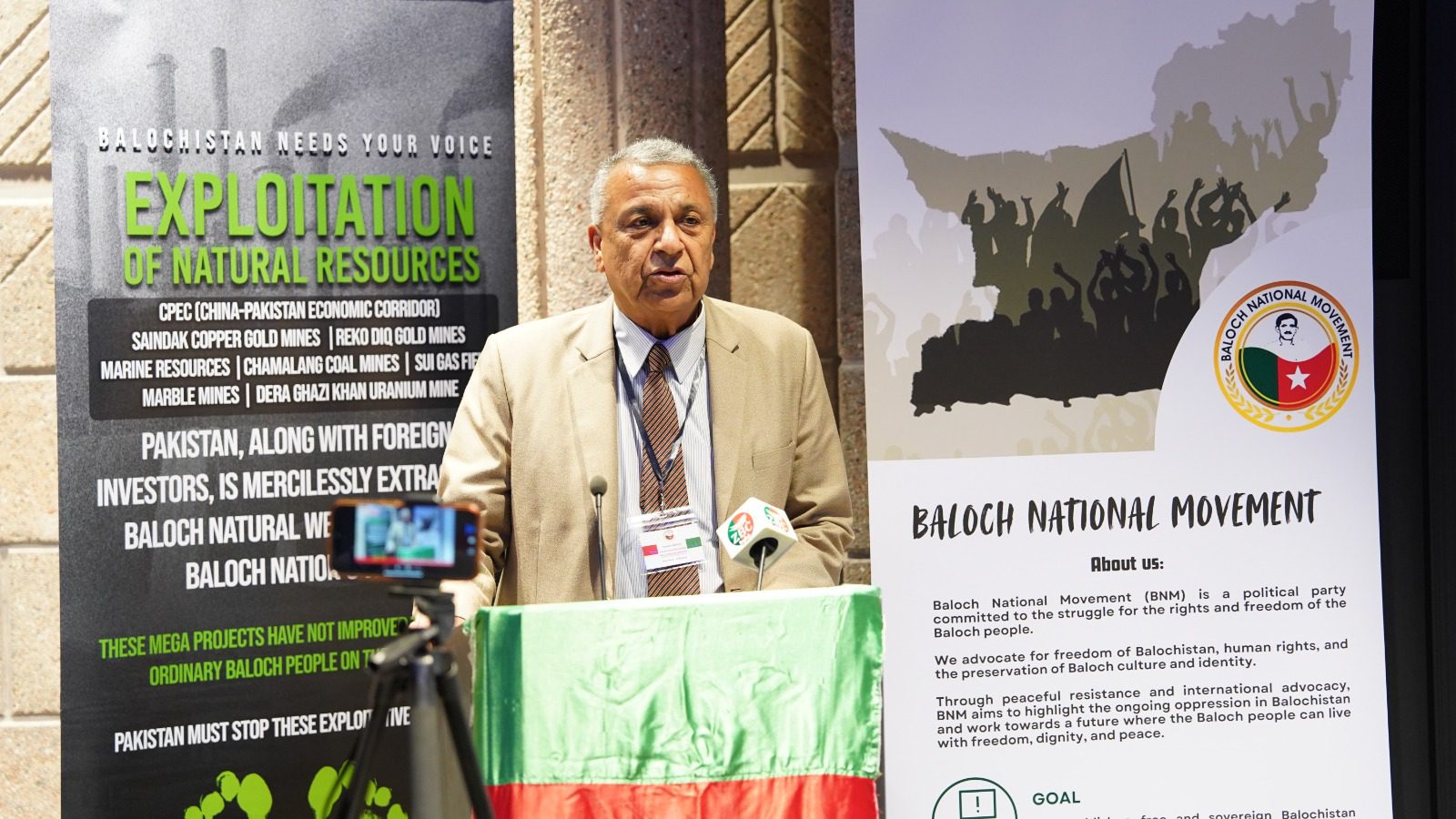Dr. Naseer Dashti, the historian and scholar, addressed the audience during the Baloch National Movement’s (BNM) 5th Balochistan International Conference in Geneva, with an impassioned speech on the struggles faced by the Baloch nation under the state of Pakistan. He began by emphasizing the distinct and unprecedented nature of the enemy that the Baloch face: Pakistan.
He remarked, “Pakistan is unique in the history of national liberation struggles. It is the only country that was supposedly liberated from a colonial power, but its ideology was forged not on its own soil but in the heart of London. The very language that Pakistan now claims as its national language is foreign to all its constituent peoples.”
Dr. Dashti critiqued Pakistan’s self-proclaimed divine origin, drawing attention to the fact that Pakistani intellectuals and school curricula claim the nation was a gift from Allah, a belief not held by any other state in the world. “This is a state that was supposedly liberated by God himself, and yet, none of its current territories, be it Punjab, Sindh, the Frontier Province, or Balochistan, had a liberation movement at the time. It was a state given by Allah, created by the British, and now it imposes itself upon us, bringing misery not only to the Baloch but to everyone in South Asia.”
In a powerful analogy, Dr. Dashti recounted the story of Genghis Khan’s conquest of Bukhara, where the religious leaders begged for mercy, invoking the wrath of Allah should Khan continue his slaughter. Genghis Khan, however, dismissed their pleas, claiming he was the embodiment of Allah’s will at that moment.
Dr. Dashti used this historical reference to liken the suffering of the Baloch under Pakistan’s rule to the devastation wrought by conquerors of the past.
“Just like the Mongols in Bukhara, Pakistan’s actions are a scourge upon us, Pashtuns, Sindhis, and the entire South Asian region. The misery they bring is unparalleled.” But beyond these historical comparisons, Dr. Dashti warned of more immediate and pressing dangers facing Balochistan. He pointed out two critical issues: the targeting of peaceful activists and the fencing of Gwadar.
Firstly, he explained how the Pakistani state has begun labeling peaceful activists as terrorists by placing them on the “fourth schedule”—a dangerous tool used by the government to monitor, restrict, and brand activists without due process. “Our youth, those who mobilize peacefully against resource exploitation and disappearances, are now being labeled as terrorists. This label allows the state to restrict their movement, making them easy targets for extrajudicial killings when the military sees fit.” This practice, Dr. Dashti said, puts the lives of Baloch youth in grave danger. The state can capture, execute, and later claim that they have eliminated so-called terrorists in “intelligence-based operations.”
He warned that this would inevitably lead to increased violence and repression in the region.The second pressing issue Dr. Dashti addressed was the fencing of Gwadar, a project funded by China as part of its Belt and Road Initiative. “The Pakistani state, with Chinese backing, is fencing off the entire town of Gwadar, including the international airport and adjacent areas. This fencing is not just physical; it symbolizes the creation of a Chinese enclave in Balochistan. It is a colonial project unlike any other—an area that will be directly controlled by the Chinese People’s Liberation Army.”
Dr. Dashti warned that this development poses severe economic, political, and social consequences for the Baloch nation. “This enclave represents the first socialist colony in our part of the world, a space completely cut off from Balochistan and under foreign control. The repercussions will be far-reaching and catastrophic for our people.”
He concluded his speech by urging all Baloch political organizations and activists to recognize the gravity of these threats. “We must take strong action. These are not isolated events; they will have long-term impacts on our social, economic, and political landscape. It is time for us to rise against these injustices before it is too late.”
To read the complete speech, please click on the following link:
Dr. Naseer Dashti, a prolific writer on Baloch issues, has authored several influential books, including Baloch Conflict with Iran and Pakistan: Aspects of a National Liberation Struggle (2017), The Baloch and Balochistan: A Historical Account from the Beginning to the Fall of the Baloch State (2012), The Voice of Reason (2008), and In a Baloch Perspective (2008). His works and numerous articles have extensively analyzed the geopolitics of South Central Asia, with a particular focus on Balochistan and Sindh.



